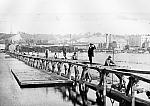
Grand Rapids Water Story, 19th Century, Part VII
Moses R. Crow and other Eastern capitalists who came here in 1886 and secured control of the hydraulic water company, evidently had one large, definite object in view – a water works monopoly in Grand Rapids. Their aims are shown very clearly by a formal proposition they made in July 1886, for the purchase of the municipal plant. They used the old hydraulic company and its “perpetual” charter as a sort of opening wedge.
When the Eastern capitalists first cast their eyes toward Grand Rapids, the hydraulic company was still furnishing water by the gravity system. The city pump system was so far ahead of it, and its supply was so rapidly becoming contaminated, that its end was apparently near. The Eastern capitalists bought up the stock of the old company below par. The entire amount of capital authorized by law was only $30,000, and as the stock was purchased considerably below par the sale price must have been much less that that sum.
Armed with the perpetual charter, the reorganized company began its overtures to the city. It chose an opportune moment for its negotiations. At this time the supply of the municipal plant was obtained from Carrier and Coldbrook creeks. The creeks were becoming contaminated, owing to increased population along their valleys, and the supply was not adequate to the demands made upon it by the growing town. The board of public works was urging a bonding proposition to secure a gallery ground water supply from the springs along the riverbank above the city. The people, however, had expressed a decided disinclination to furnish money by bonding to carry out the board’s plans.
First Attempt to Buy City Plant
Matters were looking a little desperate, when in July 1886, the hydraulic company, represented by M. R. Crow of New York and S. D. Loring of Boston, came forward and submitted to the board of public works a proposition to take over the city water works system, extend it and maintain it in a manner adequate to the community’s needs.
It proposed, in consideration for the city’s plant, to take over the water works bonded indebtedness of $882,000. Besides the relief from this bonded indebtedness, all the city was to get was free water for the city hall and the guarantee of an adequate supply of wholesome water for the entire city at rates that would now be considered high.
In return the hydraulic company asked of the city: The entire city plant, an absolute water works monopoly for thirty years, freedom from taxation, an ordinance fixing the water rates in the city, an annual rental of $60 per hydrant for 400 fire hydrants to be supplied by the company.
Company Raises its Offer
The company declared itself willing to purchase the city system for $485,066.39. Of this amount $103.066.39 was to be in cash. The remainder was the amount of the outstanding water works bonds of the city, $382.000. These, the company was to assume. The company also offered to furnish water for fire hydrants at a rate of $40 a year each for 400 hydrants, and $35 a year each when the number should reach 600. This proposition was decidedly better than the one made in July.
As an alternate proposition the company offered to lease the city plant for thirty years, at an annual rental of $25,000.
Both the July and the October propositions contained provisions that the city might buy back the system at the end of a term of years – twenty years, in the July offer, and five years in the October offer.
The special committee to which the propositions were referred reported in November that a legislative act would probably have to be secured to permit the city to sell or lease the water works system. Moreover, the committee declared itself a unit in opposition to the propositions of the company. It showed by figures that the company would have a decidedly good thing financially if it should secure the monopoly, and argued that the city should have advantage of the good thing.
In 1887 the city began suit to restrain the Hydraulic Company from tearing up the streets to lay its pipes. The courts decided against the city, holding that the charter of the company gave it the right to enter the various streets of the city under proper supervision.
Offer to Sell Out to City
Again in November 1899, Mr. Crow made another proposition to the city. It read in substance:
“There are in Grand Rapids today two systems of water works, both operated for the purpose of making them self-sustaining. That of the city, as appears from the report of the board of public works, has about fifty miles of pipe and a water debt of about $612,000. The income of the city from water works sources is insufficient to pay operating expenses and interest, and leaves a deficiency of about $20,000 annually. To complete the system with a supply from an approved source would take about $1,000,000 expenditure. It would seem that in order to settle the water question that some arrangement should be made looking to a sale of the city’s works or purchase by the city of the system operated by the Hydraulic Company.
“I would respectfully offer to buy the city’s works upon the basis of the amount of the city’s water debt, or if this basis was not satisfactory, then upon such basis of purchase as might be settled by arbitration or agreement. I have made arrangements for the necessary means to provide the city with a water supply from Lake Michigan, or such other source as you may approve, or I will endeavor to obtain a sale to the city of the Grand Rapids Hydraulic company’s property, if that may be determined upon, or a consolidation, as may be deemed best.”
The New York contract company made a Lake Michigan proposition about the same time. The two were referred to a special committee consisting of Thomas D. Gilbert, C. C. Comstock, Julius Houseman, Harvey J. Holllister, A. J. Stebbins, Louis L. Launeire and Frank A. Rodgers.
Again the Offer is Rejected
This committee in September reported against the two propositions, saying: “We have a plant that is worth all it has cost and will be worth all it may cost to perfect it. If it can be made profitable to men who propose to buy it with 6 percent money, it ought certainly be more to the city, which can obtain all the money it may need at 4 per cent. A sale of the works with a stipulated hydrant rental and price for other uses is _________public uses when the time comes, as it surely will, that the works will be self-sustaining.” (Blank indicates illegible text in the original.)
In summing up the committee says: “It is not advisable to sell the water works to any one on any basis yet presented for our consideration.
Good Policy to Buy Hydraulic Plant
“It would probably be good policy to buy the plant of the Hydraulic company if it could be obtained at its true value.
We are satisfied that we now control and can furnish as abundant supply, under good pressure, over the present and future city, of a good water as we need for the 90 to 95 per cent of all the uses to which water is applied, leaving but 5 to 10 percent to be otherwise provided if it shall be found necessary.”
The report was adopted.
The following week, December 9, 1889, Mr. Crow submitted another communication, in which he said: “Regarding the offer made to purchase the city’s works the committee did not go into that subject with me, but the offer of arbitration means that the hydraulic company would pay not less than $612,000 (the amount of the city’s bonds), or, if not agreed upon, such other figure above that as might be determined by arbitration, and take a hydrant rental of approximately $10 annually per hydrant on the existing hydrants, if the price of the works was $612,000, and free water for all city buildings.”
It will be noticed that each proposition of the company was better than the one preceding, especially in regard to hydrant rentals. This communication was simply accepted and filed.
The Final Attempt
The last propositions in 1889 followed a loan of $100,000 made to the company by a syndicate composed of Coffin & Stanton of New York, S. D. Loring of Boston, Woodbury & Moulton of Portland, Me., Elliott, Johnson & Co of Wilmington, Del., and M. R. Crow. In the loan agreement, the syndicate promised to advance further money for the purchase of the city plant at a figure not exceeding $615,000. Mr. Crow agreed to use his best endeavors to effect the purchase of the city plant.
In the spring of 1890 an effort was made to secure a popular vote on the propositions of selling the city plant or buying the Hydraulic plant. The council voted against submitting proposition.
Shortly afterward the financial difficulties of the Hydraulic company reached a crisis and the proceedings were begun that resulted in the appointment of a receiver.
Grand Rapids Press, October 19, 1904
Transcribed by Rebecca Smith-Hoffman
Article posted May 20, 2014

 facebook
facebook











